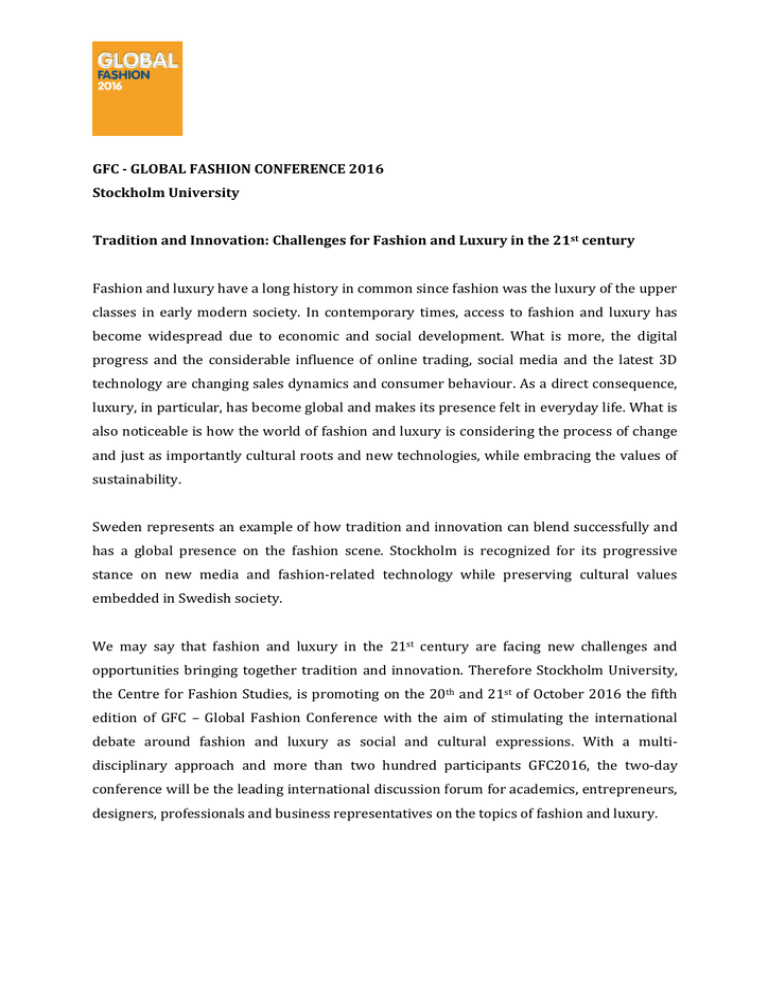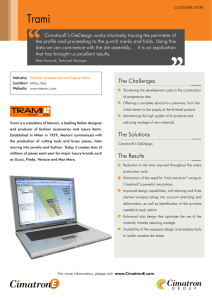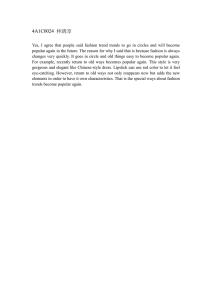GLOBAL FASHION CONFERENCE 2016 Stockholm University
advertisement

GFC - GLOBAL FASHION CONFERENCE 2016 Stockholm University Tradition and Innovation: Challenges for Fashion and Luxury in the 21st century Fashion and luxury have a long history in common since fashion was the luxury of the upper classes in early modern society. In contemporary times, access to fashion and luxury has become widespread due to economic and social development. What is more, the digital progress and the considerable influence of online trading, social media and the latest 3D technology are changing sales dynamics and consumer behaviour. As a direct consequence, luxury, in particular, has become global and makes its presence felt in everyday life. What is also noticeable is how the world of fashion and luxury is considering the process of change and just as importantly cultural roots and new technologies, while embracing the values of sustainability. Sweden represents an example of how tradition and innovation can blend successfully and has a global presence on the fashion scene. Stockholm is recognized for its progressive stance on new media and fashion-related technology while preserving cultural values embedded in Swedish society. We may say that fashion and luxury in the 21st century are facing new challenges and opportunities bringing together tradition and innovation. Therefore Stockholm University, the Centre for Fashion Studies, is promoting on the 20th and 21st of October 2016 the fifth edition of GFC – Global Fashion Conference with the aim of stimulating the international debate around fashion and luxury as social and cultural expressions. With a multidisciplinary approach and more than two hundred participants GFC2016, the two-day conference will be the leading international discussion forum for academics, entrepreneurs, designers, professionals and business representatives on the topics of fashion and luxury. Themes suggested: 1. Luxury and Fashion The essence of luxury Luxury as craftsmanship and tradition Taste and quality: lifestyle issues Luxury as an industry Luxury as cultural production Luxury and technology The emotional aspects of luxury and fashion 2. Luxury, Fashion and Technology Digital Retail and Consumption (E - and M-Commerce) 3-D Printing and alternative modes of production Fashion and New media Wearables and the Internet of things On-line co-creation process and branding Smart materials The economy of happiness and fashion 3. Luxury, Fashion and Sustainability The essence of sustainability Designers and Brands: Advances on sustainable fashion Craftsmanship, tradition and sustainability The circular economy and the global fashion industry Smart cities and sustainable fashion Fashion and the sharing economy Combining sustainability and growth for fashion businesses How to manage the supply chain in terms of Corporate Social Responsibility 4. Stockholm: The Nordic Fashion Tech Capital City and daily elegance Trendsetting Innovation and Creativity Communicating culture: fashion city and social media Other proposals on each and every one of these four topics are very much welcomed IMPORTANT DATES 1. March – April – May 2016 Deadline for submission of abstracts: 31st of May Opening of registrations: 1st of May 2016 (early fee rate until the end of July) 2. June – July 2016 Peer Review and feed-back to Authors/Proponents 3. August - September Deadline to Register: 23rd of September (late fee rate since the 1st of August) Release of final Programme: 23rd of September 4. October 2016 CONFERENCE: 20th and 21st of October Release of Proceedings under electronic format Please submit your abstract before May 31st, 2016 to: globalfashionconference@gmail.com The title of the abstract should be no longer than 12 words, and the abstract itself should have between 250 and 400 words and up to five keywords. Abstracts will be reviewed by the Scientific Committee of GFC2016. The language of the conference is English and oral presentations are limited to 15 minutes. The Global Fashion Conference Organizing Committee Paula von Wachenfeldt, Centre for Fashion Studies, Stockholm University Emma Lindblad, Centre for Fashion Studies, Stockholm University Ulrika Kyaga, Centre for Fashion Studies, Stockholm University Dominique Jacomet, Institut Français de la Mode, France Isabel Cantista, Universidade Lusíada do Porto, Portugal



